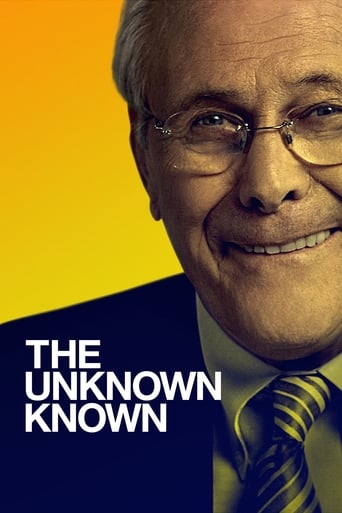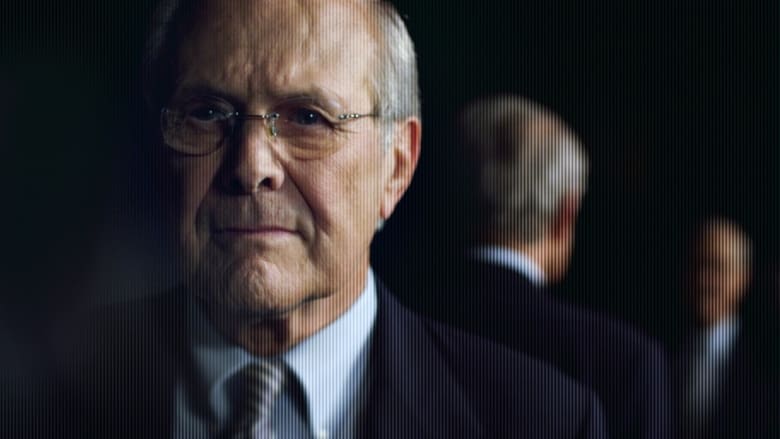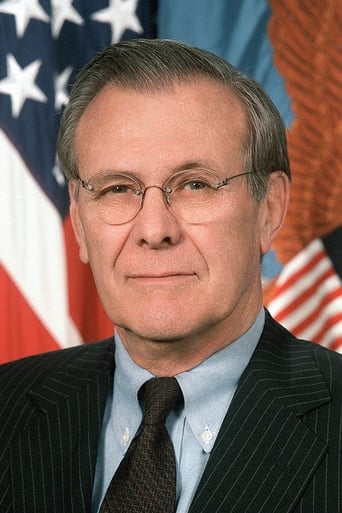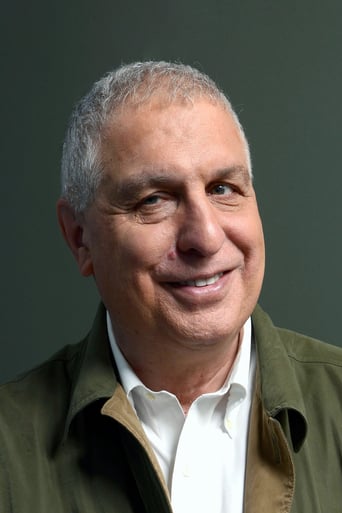
Former United States Secretary of Defense, Donald Rumsfeld, discusses his career in Washington D.C. from his days as a congressman in the early 1960s to planning the invasion of Iraq in 2003.
Reviews
I think this is a new genre that they're all sort of working their way through it and haven't got all the kinks worked out yet but it's a genre that works for me.
Best movie of this year hands down!
Great example of an old-fashioned, pure-at-heart escapist event movie that doesn't pretend to be anything that it's not and has boat loads of fun being its own ludicrous self.
An old-fashioned movie made with new-fashioned finesse.
Donald Rumsfeld has the power to fascinate some, alienate and irritate others, but mesmerize many, which makes him the perfect person to sit before Errol Morris's trademark device known as "the Interrotron" and provide us with a wealth of information on his life as the U.S. Secretary of Defense during the birth and height of the War on Terror in America. Morris's "Interrotron" is a device that allows the subject to look through a two way mirror and see Errol Morris, with a camera the subject can't see being pointed at them. This allows for a more conversational approach to an interview, and because Morris is such a confident documentarian (especially in this case), his style and approach to his subjects allows for something more impressive and entertaining than your average "talking head" documentary.Immediately, any fan of Morris will compare The Unknown Known to his other film The Fog of War: Eleven Lessons from the Life of Robert S. McNamara, which showed Morris talking to U.S. Secretary of Defense Robert S. McNamara, who served during some of the most critical times in American history, like the Bay of Pigs crisis and the Vietnam War. McNamara was a subject who you didn't need to make talk, for he always seemed to be alive and interested in sharing his ideas and his experiences with Morris. On this hand, Rumsfeld feels more interested in trying to find easy answers and dodge some of Morris's most biting questions (including whether or not having the United States involve themselves in Iraq's affairs and eventually engaging in a war with them was justified or miscalculated).One can see Rumsfeld is a seasoned veteran when it comes down to giving cleverly-worded answers as opposed to straight ones. When looking to explain certain topics, Rumsfeld gets lost in cute words, unnecessary wording that's prime purpose is to be confusing (just look at the film's title, which is a direct quote from Rumsfeld himself), and inane sloganeering and simplifying. I was reminded of the documentary Nick Nolte: No Exit, where actor Nick Nolte decided to make a film about him interviewing himself in a weirdly-meta format. Nolte was less interested in answering the questions and more interested with simply talking around them, which made me question why he even bothered to make a documentary about interviewing himself when he was going to answer any questions he was going to ask himself in the first place. But at least Nolte didn't tack on a goofy and quietly infuriating grin at the end of his answers.Rumsfeld isn't that bad when compared to Nolte, however. After all, he doesn't take the hugely-questionable route of interviewing himself with the film, but he still finds ways to dodge clear answers to Morris's serious questions and finds ways to confuse himself, and the audience for that matter, throughout the documentary. For example, an early scene in the film involves Rumsfeld defining the four levels of "knowns" in the world. He tells us "known knowns" are things we know we know. He says "known unknowns" are things we know we don't know. He says "unknown unknowns" are things we know we don't know. And finally, he acknowledges the film's title and tells us "unknown knowns" are things we thought we knew but didn't. This ridiculous way of phrasing concepts will only further make political concepts more abstract to the politically ignorant, probably enforcing the reason why they're lost all the more.The concept of "knowns" came to be when Rumsfeld acknowledged the presence of weapons of mass-destruction (WMDs) in Irag in 2002 during a speech which went on to be known from the single line "there are known knowns." In other words, Rumsfeld was supremely confident that the then-ruler of Iraq Saddam Hussein was housing WMDs in Iraq and was up to no good. The Unknown Known explores Rumsfeld's duty as the Secretary of Defense during that time and the legacy he left on the cabinets he was employed under, Gerald Ford and George W. Bush, respectively. During his time, Rumsfeld came to be known as someone who wrote and issued the most memorandums to other officials he worked with. Rumsfeld states that just from working at The Pentagon for a relatively short time he issued over 20,000 memos, so in his lifetime, he had to have issued well over a million, so he claims.The Unknown Known is conducted at a brisk pace, with Morris's editing and confident filmmaking techniques taking prominence over Rumsfeld's detailed accounts on how it was to work in The Pentagon on the day of September 11, 2001 and his wishy-washy answers on methods of torture and the hugely controversial act of waterboarding. The one detail I noticed with the film is how Morris's editing seemed to play a bigger role than ever with this film to the point where I question whether or not Rumsfeld was dancing around questions or was Morris editing the interview together in such a strange way.Despite the film being easy to compare to Morris's The Fog of War, I find that the film could also easily be compared to one Morris's more recent efforts by the name of Tabloid, an underrated documentary concerning a former Miss Wyoming model who allegedly kidnapped and raped a Mormon missionary. I find both The Unknown Known and Tabloid to be two of a kind because they both show how people can come to their own conclusions and work hard to establish the truth that they want to believe. Even The Fog of War had truth-seeking undertones in the regard that it showed McNamara's perspective on certain issues, showing that history isn't so objective after all. If Errol Morris's films thus far have a moral to them that connects each one in some way, I'm pretty confident in saying I have found something within them all.Starring: Donald Rumsfeld. Directed by: Errol Morris.
This documentary was just as gratuitous and ridiculous as our government. Morris thought he was smart and clever with this documentary but really answered no questions and made himself look as silly and absent as any politician. His tactics were narcissistic and self righteous and he fits right in with any ambitious capitalist trying to "up" someone, making him seem more intelligent, when he really showed he is lacking in film making and story telling. All Morris did was show commonalities with himself and Rumsfeld. If he wants to create a documentary, maybe he should take interviewing classes instead of trying to massage his own ego.
The Unknown KnownThere is a myth about the documentary film genre that it is some sort of quest for objective truth; when in fact there is no greater and often times no more effective means of subjective film making . No documentarian worth his salt is going to go forward with a project without a point of view.And so it is with documentarian Errol Morris as he tries to pin down former defense secretary Don Rumsfeld to some objective truths about the war in Iraq. It's slow going.For Morris this is not without precedent. In his "The Fog of War" he was able to get Lyndon Johnson's (and I should also add John Kennedy's) secretary of defense Robert Mac Namara, a chief architect of the Viet Nam war to show contrition, regret and even self pity about the advice he gave and decisions he made during that turbulent time. To those like Morris who believe that the Viet Nam war was a disaster, this must have proved satisfying. They gave him an Academy Award for it . Morris also believes the Iraq war was a disaster but in Rumsfeld he found a much tougher nut to crack.The film documents Rumsfeld's rise to power as a career politician and bureaucrat in which he navigated through many a troubled water to become a trusted confidant and administrator for Presidents Ford, Reagan, and Bush the second, and given a certain set circumstances might have become President of the United States. But he made some enemies too, Nixon chief of staff Bob Haldeman, George Bush the first, and his national security adviser Brent Scowcroft, as well as a very public feud with Condoleezza Rice. And these were his fellow Republicans! Richard Nixon called Rumsfeld "a ruthless little bastard" and I can't imagine a statement like that coming from higher authority. The long and the short of it is that Rumsfeld has faced off against a lot tougher guys than Errol Morris.Morris seems now to suspect that Rumsfeld might have got the best of him, since in his post release interviews he emphasizes how Rumsfeld "horrifies' him. However, that doesn't come off in the film. Rumsfeld appears to be a man of considerable charm and wit, with an easy humor about events and himself. It is well to remember that Rumsfeld fully co-operated with this project, one might even say eagerly co-operated. He wanted his side publicly aired and decided to do it this way, even though he knew Morris's predisposition. To Morris's credit he gives Rumsfeld free reign and ample opportunity to make his case. But Rumsfeld does not control the editing process and it here that Morris strikes back. Using cross cutting, graphics, and archival footage Morris exposes Rumsfeld's renowned candor as a smokescreen for obfuscation and evasion. Most particularly, in Rumsfeld's now famous, or infamous if you prefer, philosophical rumination on what could be known or unknown , or whatever the hell he said, in response to a direct question as to whether he (Rumsfeld) had any evidence that Sadam Hussein had participated or assisted in the 9/11 attacks. This was called by the press at the time (rather admiringly I might add) as "Rummy speak". In the film Rumsfeld admits there wasn't then and isn't now any such evidence.Even more telling to me was his mastery of expressing a limited truth and passing it off as candor. In summing up the Viet Nam War Rumsfeld says this: "Some things work out, some things don't .That one didn't." Hard to argue with that. True, as far as it goes, but it does not illuminate. Hell, I could have come up with that over a couple of Irish Whiskeys at the local tavern, and maybe even thought to be pretty profound by my fellow inebriates at the bar, but I think we have a right to expect more than that from our public officials. Did we learn anything? Would we do anything differently? In listening to Rumsfeld's echo the answer is apparently and depressingly, no. Given the perceived threats at the respective times in Iraq and Viet Nam, our policy makers did exactly the same thing. Author Evan S. Connell in his book "Son of the Morning Star" recounts how General Philip Sheridan as one of the key policy makers leading to the destruction of the Plains Indian tribes after the defeat of Custer at the Little Big Horn, reflected on his role. Sheridan seemed to empathize with the Indians and implied that had the situations been reversed, he would have acted in the very same way the Indians had. He would have resisted. To which Connell comments: "Like other generals, bureaucrats and private citizens who contribute to some irrevocable disaster, he wondered about it afterward." Not Donald Rumsfeld, no qualms, no regrets, no apologies. He did his duty and history can sort it out. And of course it will.Morris ends the film with a shot of an empty ocean which I took to be metaphor and interpreted thus: It is shimmering and shiny, even magnificent to look at but who knows what horrors lie beneath the surface. Like Donald Rumsfeld, it covers the "Unknown Knowns".
I want to first say that I thought Errol Morris' previous film - the fog of war - was excellent. I am a fan of his style and also of his ambition to take on such large characters of history. However, I think he failed this last attempt quite dramatically. The movie was boring, redundant, un-insightful, and - worst of all - wasted an hour and a half of my life. In my opinion there are only a few reason why this turned out to be a failure: 1) Don is actually a pretty honest guy (but boring) and remembers quite a lot which takes Errol by surprise 2) Errol didn't pull the trigger on (i.e. address on camera) some big inconsistencies in his memos and his interviews 3) Errol goes into this thinking he has Don with the millions of memos and hours of interview time but then gets completely dismantled by Don in his questioning thus resulting in wasted time/filmWhile I cannot tell you which is true, the result is a failure by the director to really provide the audience any sort of substance for his money/time. I wish Errol would have either asked Don about more or not marketed the film as something a history buff may like. Lastly some of my many questions from the movie: Honestly, who really cares about how the words unknown and known are put together in a sentence?? Out of all the interesting stuff this man knows why did you consistently highlight (i.e. use film time for) the fact that hes a word freak and wrote millions of memos? So this guy is pedantic...we get it but who cares??? Why did you show hundreds of newspaper headlines but really not get the bottom of any of them? How did you not find one slip up in those millions of memos? Why did you choose Don if you knew how smart/clever/boring he was?Do yourself a favor and go watch fog of war and don't waste your time on this like the director did.
Top Streaming Movies















